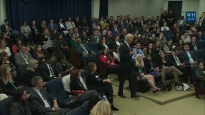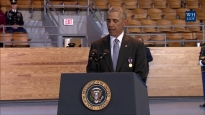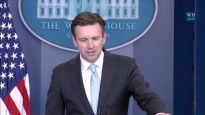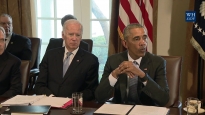President Obama Speaks on Raising the Minimum Wage
February 12, 2014 | 19:02 | Public Domain
President Obama delivers remarks on the importance of raising the federal minimum wage for all workers and signs an Executive Order requiring federal contractors to pay their federally funded employees on new contracts a fair wage of at least $10.10 an hour.
Remarks by the President on Signing of Executive Order
East Room
2:18 P.M. EST
THE PRESIDENT: Well, welcome to the White House, everybody. I know you had to come here before you go buy some shovels and some salt. (Laughter.) It sounds like we may get a little snow. But I very much appreciate everybody being here. I want to thank, first and foremost, the workers who are with me here this afternoon. (Applause.) And I want to thank two champions for all hardworking Americans: We've got Secretary of Labor Tom Perez -- (applause) -- he’s in the house. Where is Tom? Right here. Tom is right here. (Applause.) I didn’t know where he was. And we've got an outstanding Congressman -- who’s used to snow because he’s from Minnesota -- Congressman Keith Ellison. (Applause.)
Now, it’s been just over two weeks since I delivered my State of the Union address, and I said this year would be a year of action, and I meant it. Over the past 14 days I’ve ordered an across-the-board reform of our job training programs to train folks with the skills that employers need, and then match them up with good jobs that are ready to be filled right now.
I’ve directed the Treasury to create something we're calling “MyRA” -- sort of like an IRA, but it's MyRA. And that's a new way for Americans to start saving for retirement. And you can start with as little as $25, $50 and start building up a little bit of a nest egg and get tax benefits for doing it so.
We’ve rallied the leaders of some of America’s biggest high-tech companies to help us make sure that all of our kids have access to high-speed Internet and up-to-date technology in their classroom so that they’re learning the skills that they need for the new economy.
We’ve brought together business leaders who are committed to hiring more unemployed Americans, particularly long-term unemployed who oftentimes are discriminated against. They’re in a Catch-22 -- they haven't had a job for a while and then the employer is not willing to look at their resume because they haven't had a job for a while.
So the point is I’m eager to work with Congress whenever I can find opportunities to expand opportunity for more families. But wherever I can act on my own, without Congress, by using my pen to take executive actions, or picking up the phone and rallying folks around a common cause, that’s what I’m going to do. (Applause.)
And so that brings me to the issue we're going to talk about today. After the worst economic crisis in generations, our economy has been growing for the past four years. (Applause.) And our businesses have created 8.5 million new jobs. Unemployment rate has come down. But while those at the top are doing better than ever, -- corporate profits have been high, the stock market has been high -- average wages have barely budged. So you’ve got too many Americans who are working harder than ever before just to get by, but they can't seem to get ahead, can't seem to make all the ends meet.
And that’s been true since long before the recession hit. We’ve got to reverse those trends. We’ve got to build an economy that works for everybody, not just the fortunate few. And we’ve got to restore opportunity for everybody, so that no matter who you are, no matter how you started out, no matter what you look like, no matter what your last name is, you can get ahead in America if you're willing to work hard and take responsibility for your life. (Applause.) Right?
So the opportunity agenda I’ve laid out is going to help us do just that. Part one of this agenda is more new jobs that pay a good wage -- jobs in manufacturing, and exports, and energy, and innovation. Part two: We've got to train the folks with the skills to fill those jobs. Part three: We've got to make sure every child gets a world-class education. And part four: We've got to make sure that the economy rewards hard work for every American.
Making hard work pay off with economic security and decent wages and benefits is what we’re about here today. It means making sure women earn equal pay for equal work. (Applause.) It means making sure workers have the chance to save for a dignified retirement. (Applause.) It means access to affordable health insurance that gives you the freedom to change jobs or be your own boss, and the peace of mind that it will be there for you when you get sick and you need it most. (Applause.)
So if you know anybody who doesn’t have health insurance right now -- (laughter) -- send them to healthcare.gov. The website is working. (Laughter.) Sign them up. You can get health care for less than your cellphone bill for a lot of folks.
But it also means that in the wealthiest nation on Earth, nobody who works full-time should have to live in poverty. (Applause.) Nobody. Not here in America. (Applause.)
Now, it was one year ago today -- one year ago today -- that I first asked Congress to raise the federal minimum wage -- a federal minimum wage that in real terms is worth about 20 percent less than it was when Ronald Reagan took office -- 20 percent less, a fifth less.
So this afternoon, I’ve invited some of the folks who would see a raise if we raised that federal minimum wage. They happened to join me here at the White House. And like most workers in their situation, they’re not teenagers -- they look like teenagers, some of them are very young looking. (Laughter.) But they’re not teenagers taking on their first job. They’re adults -- average age is 35 years old. A majority of lower-wage jobs are held by women. Many of them have children that they’re supporting. These are Americans who work full-time, often to support a family, and if the minimum wage had kept pace with our economic productivity, they’d already be getting paid well over $10 an hour.
Instead, the minimum wage is still just $7.25. And when Congress refuses to raise it, it loses value -- because there’s a little bit inflation, everything else starts costing a little bit more -- even though inflation has been pretty low, it’s still costing a little bit more each year. That means each dollar isn’t going as far and they’ve got a little bit less. So over the past year, the failure of Congress to act was the equivalent of a $200 pay cut for these folks -- for a typical minimum wage worker. That’s a month worth of groceries, maybe two months’ worth of electricity. It makes a big difference for a lot of families.
Now, the good news is that in the year since I first asked Congress to raise the minimum wage, six states went ahead and passed laws to raise theirs. (Applause.) We appreciate that. You got more states and cities and counties that are taking steps to raise their minimum wage as we speak. And a lot of companies are doing it, too -- not out of charity, but because they’ve discovered it’s good business.
Two weeks ago, I visited a Costco store in Maryland. Now, Costco is a very profitable company. Its stock has done great. It’s expanding all over the place. But their philosophy is higher wages are a smart way to boost productivity and reduce turnover. If employees are happy and feel like the company is invested in them, then they’re going to do more for the company. They’re going to go above and beyond.
And when I was over at the Costco store I was meeting folks who had started off at the cash register and now were in supervisory positions, and had been there for 20 years, and you could see the kind of pride that they had in the company because the company cared about them. I even received a letter the next day from a woman who saw my visit on TV -- she decided to apply for a job at Costco. (Laughter.) She said, let me apply for a job at Costco. They look like they can do a good job.
So across the country, owners of small and large businesses are recognizing that fair wages and higher profits go hand in hand; it’s good for the bottom line.
And as America’s chief executive, I agree. So while Congress decides what it’s going to do -- and I hope this year, and I'm going to work this year and urge this year that they actually pass a law -- today, I’m going to do what I can to help raise working Americans’ wages. (Applause.)
So today, I’m issuing an executive order requiring federal contractors to pay their employees a fair wage of at least $10.10 an hour -- (applause) -- $10.10 an hour. (Applause.)
This will make a difference for folks. Right now, there’s a dishwasher at Randolph Air Force Base in Texas making $7.76 an hour -- $7.76 an hour. There’s a fast-food worker at Andrews, right down the street, making $8.91 an hour. There’s a laundry worker at Camp Dodge in Iowa making $9.03 an hour. Once I sign this order, starting next year, as their contracts come up, each of them and many of their fellow coworkers are going to get a raise. And by the way, that includes folks who get paid in tips -- they’ll get a raise, too. (Applause.) A tip wage has gone up even slower than the regular minimum wage.
So just as it’s good for companies across the country, this will be good for America’s bottom line -- for contractors and for taxpayers. The opponents of the minimum wage have been using the same arguments for years, and time and again they’ve been proven wrong. Raising the minimum wage is good for business, and it's good for workers, and it's good for the economy. Put more money in these folks’ pockets, that means they got some money to go shopping, which in turn means the business has more customers -- (applause) -- which means they may hire more workers and make more of a profit. (Applause.)
And let’s not forget -- not only is it good for the economy, it’s the right thing to do. (Applause.) There’s a simple moral principle at stake -- if you take responsibility and you work as hard as these folks work, if you work full-time, you shouldn’t be living in poverty. Not in America. We believe that. (Applause.)
And this executive order will cover Americans with disabilities -- (applause) -- because this principle doesn’t just apply to some of us; it applies to all of us. (Applause.)
So I’m going to keep doing whatever I can to raise working Americans’ wages. And I would ask any business leader out there, any governor, any mayor, any local leader listening, do what you can to raise your employees’ wages; to work to raise the wages of citizens in your jurisdiction. They’ll support these efforts. A majority of Americans -- not just Democrats, not just independents, but Republicans, too -- support raising the minimum wage. (Applause.) It's the right thing to do. So that’s something Congress should keep in mind this year.
There’s a bill right now in front of both the House and the Senate that would boost America’s minimum wage to $10.10 an hour -- just like I'm doing with this executive action. It’s easy to remember: 10-10 -- 10-10. Let’s get that done. Raise the federal minimum wage to $10.10 wouldn’t just raise wages for minimum-wage workers, its effect would lift wages for about 28 million Americans. It would lift millions of Americans out of poverty immediately. (Applause.) It would help millions more work their way out of poverty -- without requiring a single dollar in new taxes or spending. (Applause.) It's the right thing to do.
Just last month, 600 economists, including seven Nobel Prize winners, wrote the leaders of houses of Congress to remind them that the bill before Congress would have little or no negative effect on hiring, on jobs. So it's not going to depress the economy. It will boost the economy. (Baby says, “Yes!”) Yes! (Laughter and applause.) It will give more businesses more customers with more money to spend. It will grow the economy for everybody. So -- yeah! (Laughter.) He’s excited about it. (Laughter.)
So members of Congress have a pretty clear choice to make right now: Raise our workers’ wages, grow our economy -- or let wages stagnate further, and give workers what amounts to another pay cut this year. Restore unemployment insurance for Americans still looking for that job -- (applause) -- or expose them further to hardship. (Applause.) Members of Congress, you can help people make progress in their own lives, or you can hinder that progress.
And every American deserves to know where your elected representative stands on this issue. So ask your senator; ask your representative in the House: Do you support raising the federal minimum wage to $10.10 an hour? If they say, yes, tell them “good job.” (Laughter.) They don’t hear that that often so -- (laughter) -- give them a pat on the back, give them a hug, let them know “way to go.” That's the right thing to do. If they say, no -- be polite, I mean, don't just yell at them, but say, “Well, why not?” Ask them to reconsider siding with an overwhelming majority of Americans. Encourage them to say yes. Give America a raise.
So I’m about to sign this executive order. When you hear me talking about my pen and my phone to make a difference for middle-class Americans and those working to get into the middle class, this is exactly what I mean. I’m doing to do what I can. Congress should do what it needs to do. I will not give up on this fight, no matter how long it takes. America deserves a raise. (Applause.) Working families deserve to know some more economic security in their own lives. (Applause.)
We've got to create new jobs, strengthen the middle class, build new ladders of opportunity for folks working their way into the middle class -- just like these folks are doing right here. There are millions of Americans who could just use a little bit of boost -- millions of Americans outside Washington who are tired of the old, stale political arguments, or tired of folks just looking out for people who can afford big lobbyists and big campaign contributions. There are folks out there who want to see us restore an economy that works for everybody, and get back to our founding vision of opportunity for all.
So I know you guys will work with me. But go out there and organize some more. Thank you, everybody. (Applause.) Let’s give Americans a raise right now. I’m going to sign this. (Applause.)
END
2:30 P.M. EST
|
January 6, 2017
|
January 6, 2017
|
January 5, 2017
|
January 5, 2017
|
|
January 4, 2017
|
January 4, 2017
|
January 4, 2017
|
January 4, 2017
|
- &lsaquo previous
- 1
- 2
- 3
- 4
- 5
- 6
- 7
- 8
- 9
- …
- next &rsaquo







